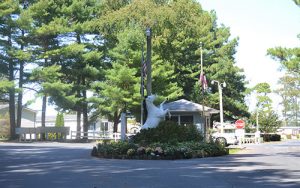
SNOW HILL – White Horse Park residents are claiming victory after a judge denied motions for summary judgment and dismissal this week.
On Tuesday, Worcester County Circuit Court Judge Daniel Long heard arguments from lawyers regarding the county’s plan to begin enforcing seasonal occupancy restrictions at White Horse Park. While the plaintiffs, a group of White Horse Park residents who have lived there full-time for years, believe the county doesn’t have the ability to begin enforcing occupancy restrictions when they’ve not been enforced for 30 years, defendants — Worcester County and the White Horse Park Board of Directors — argue that the park was developed as a seasonal community and that year-round occupancy is prohibited in its declaration of restrictions.
Long denied motions to dismiss the case as well as a motion for summary judgment.
“This is very well done by all of you,” he told attorneys during Tuesday’s hearing. “Your arguments are good, they’re solid. It makes it more challenging for the court.”
The lawsuit was filed against Worcester County last year by a group of year-round White Horse Park (WHP) residents after the county announced plans to begin enforcing the park’s seasonal occupancy restrictions. Residents, many of whom have lived at WHP for years, were advised they would face daily fines if they didn’t abide by the park’s zoning restrictions, which don’t allow year-round occupancy. Attorney Hugh Cropper, who represents the residents, filed both an administrative appeal and a complaint for declaratory judgment.
Not long after the complaint was filed, the WHP board got involved, joining the county in its effort to prevent full-time occupancy at the park. In the months since, the lawsuit and the administrative agency appeal were consolidated and motions related to each were the subject of Tuesday’s hearing.
Attorney Victoria Shearer, representing Worcester County, and attorney James Almand, representing the WHP board, stressed that the park had been established as a seasonal community and that the plaintiffs were aware of that. Shearer said the full-time residents had asked the county to approve a text amendment last year that would allow them to continue living in their homes year-round.
“This lawsuit is an attempt by the plaintiffs to achieve through the court what they could not legislatively,” she said.
According to Shearer, the residents’ primary argument of estoppel—the principle that precludes someone from asserting a claim inconsistent with their previous conduct—was rarely if ever applicable against government. Long interjected, asking why the county was trying to enforce the occupancy restrictions now when it hadn’t in the past.
“The first thing that jumped out to me is why now?” Long said.
Shearer said it ultimately didn’t matter why the county wanted to enforce the restrictions.
“It may not but it’s a fair question,” the judge said.
Shearer replied that issues and problems had arisen that brought the need for enforcement to the county’s attention.
“The county felt a need to step in,” she said.
Almand said the county initiated enforcement efforts after receiving complaints related to renters in WHP.
He said year-round occupancy would change the dynamic of the park, because there would be a greater demand on infrastructure that would shift the burden to taxpayers. Almand acknowledged that the park had changed, as the plaintiffs argued, to include more than just RVs, but said that didn’t matter.
“It’s not whether it’s a stick built or a tent,” he said. “It’s whether you live in either one full-time.”
Almand also said that if the existing year-round residents were able to remain in the park, the board would have trouble ensuring they were the only ones who did so.
“That’s a herculean task,” he said.
Attorney Margaret Witherup, who with Cropper is representing the full-time residents, told the judge that several of those residents had lived in the park for more than 30 years. In that time, they’ve built homes up to county standards and paid taxes.
“For many of the plaintiffs this is their only home,” she said.
Cropper said his aim wasn’t to set aside the park’s whole declaration but rather stop enforcement against the 45 people who were year-round residents in June of 2018 when the issue of enforcement first came up. Over the years, Witherup said many of the residents were told by realtors, park management and board members that they could remain in their WHP homes full-time.
“The association requested, condoned and acquiesced in allowing some full-time occupancy,” Witherup said.
Shearer and Almand maintained that any sort of exemption for those residents would not be fair.
Long denied motions to dismiss the lawsuit as well as a motion for summary judgment, pointing out there were disputes with regard to the facts and also that he had to view the evidence in the light most favorable to the plaintiffs. He said he would reserve his decision on the motion to dismiss the administrative appeal and expected to rule on that within 30 days. A settlement hearing is set to take place in October with a trial scheduled for Dec. 15 and 16.

